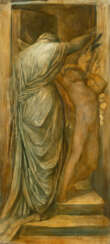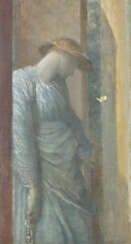джордж фредерик уоттс (1817 - 1904)

George Frederic Watts was a distinguished British painter and sculptor associated with the Symbolist movement, celebrated for his allegorical works such as "Hope" and "Love and Life." Born in 1817, Watts's career spanned the Victorian era, during which he developed a style that sought to imbue his works with moral and philosophical depth. His ambition was to affect the viewer's mind through "nobility of line and color," aiming to elevate art to a medium of serious reflection and commentary on humanity's condition.
George Frederic Watts's early influences included the Elgin Marbles and the works of Titian, which inspired him to strive for a grandeur in his art that was both morally uplifting and aesthetically profound. He was a part of the vibrant cultural milieu of the Victorian era, mingling with notable figures of the time in the Prinsep circle of bohemians and contributing significantly to the artistic and intellectual life of 19th-century Britain.
Among Watts's most celebrated works are "Hope," featuring a blindfolded figure with a lyre, and "The Sower of the Systems," a visionary piece that prefigured abstract painting and explored themes of creation and the cosmos. This latter work, completed towards the end of his life, exemplifies Watts's lifelong fascination with the interplay between art, science, and spirituality.
George Frederic Watts's legacy is preserved in the Watts Gallery in Compton, Surrey, dedicated to his work, and through his contributions to public art, including the monumental sculpture "Physical Energy" in Kensington Gardens, London. His portraits of prominent Victorians, which include political, literary, and cultural figures, remain highly regarded for their insight and depth.
For those interested in the intersections of art, culture, and history, George Frederic Watts's work offers a rich exploration of Victorian values, aspirations, and anxieties. His enduring influence on British art and his role in the Symbolist movement make his work a key subject of study for collectors and experts in art and antiques.
To stay informed about exhibitions, sales, and events related to George Frederic Watts, signing up for updates is recommended. This will ensure that enthusiasts and collectors alike are always up-to-date on opportunities to engage with Watts's impactful legacy.


George Frederic Watts was a distinguished British painter and sculptor associated with the Symbolist movement, celebrated for his allegorical works such as "Hope" and "Love and Life." Born in 1817, Watts's career spanned the Victorian era, during which he developed a style that sought to imbue his works with moral and philosophical depth. His ambition was to affect the viewer's mind through "nobility of line and color," aiming to elevate art to a medium of serious reflection and commentary on humanity's condition.
George Frederic Watts's early influences included the Elgin Marbles and the works of Titian, which inspired him to strive for a grandeur in his art that was both morally uplifting and aesthetically profound. He was a part of the vibrant cultural milieu of the Victorian era, mingling with notable figures of the time in the Prinsep circle of bohemians and contributing significantly to the artistic and intellectual life of 19th-century Britain.
Among Watts's most celebrated works are "Hope," featuring a blindfolded figure with a lyre, and "The Sower of the Systems," a visionary piece that prefigured abstract painting and explored themes of creation and the cosmos. This latter work, completed towards the end of his life, exemplifies Watts's lifelong fascination with the interplay between art, science, and spirituality.
George Frederic Watts's legacy is preserved in the Watts Gallery in Compton, Surrey, dedicated to his work, and through his contributions to public art, including the monumental sculpture "Physical Energy" in Kensington Gardens, London. His portraits of prominent Victorians, which include political, literary, and cultural figures, remain highly regarded for their insight and depth.
For those interested in the intersections of art, culture, and history, George Frederic Watts's work offers a rich exploration of Victorian values, aspirations, and anxieties. His enduring influence on British art and his role in the Symbolist movement make his work a key subject of study for collectors and experts in art and antiques.
To stay informed about exhibitions, sales, and events related to George Frederic Watts, signing up for updates is recommended. This will ensure that enthusiasts and collectors alike are always up-to-date on opportunities to engage with Watts's impactful legacy.


George Frederic Watts was a distinguished British painter and sculptor associated with the Symbolist movement, celebrated for his allegorical works such as "Hope" and "Love and Life." Born in 1817, Watts's career spanned the Victorian era, during which he developed a style that sought to imbue his works with moral and philosophical depth. His ambition was to affect the viewer's mind through "nobility of line and color," aiming to elevate art to a medium of serious reflection and commentary on humanity's condition.
George Frederic Watts's early influences included the Elgin Marbles and the works of Titian, which inspired him to strive for a grandeur in his art that was both morally uplifting and aesthetically profound. He was a part of the vibrant cultural milieu of the Victorian era, mingling with notable figures of the time in the Prinsep circle of bohemians and contributing significantly to the artistic and intellectual life of 19th-century Britain.
Among Watts's most celebrated works are "Hope," featuring a blindfolded figure with a lyre, and "The Sower of the Systems," a visionary piece that prefigured abstract painting and explored themes of creation and the cosmos. This latter work, completed towards the end of his life, exemplifies Watts's lifelong fascination with the interplay between art, science, and spirituality.
George Frederic Watts's legacy is preserved in the Watts Gallery in Compton, Surrey, dedicated to his work, and through his contributions to public art, including the monumental sculpture "Physical Energy" in Kensington Gardens, London. His portraits of prominent Victorians, which include political, literary, and cultural figures, remain highly regarded for their insight and depth.
For those interested in the intersections of art, culture, and history, George Frederic Watts's work offers a rich exploration of Victorian values, aspirations, and anxieties. His enduring influence on British art and his role in the Symbolist movement make his work a key subject of study for collectors and experts in art and antiques.
To stay informed about exhibitions, sales, and events related to George Frederic Watts, signing up for updates is recommended. This will ensure that enthusiasts and collectors alike are always up-to-date on opportunities to engage with Watts's impactful legacy.


George Frederic Watts was a distinguished British painter and sculptor associated with the Symbolist movement, celebrated for his allegorical works such as "Hope" and "Love and Life." Born in 1817, Watts's career spanned the Victorian era, during which he developed a style that sought to imbue his works with moral and philosophical depth. His ambition was to affect the viewer's mind through "nobility of line and color," aiming to elevate art to a medium of serious reflection and commentary on humanity's condition.
George Frederic Watts's early influences included the Elgin Marbles and the works of Titian, which inspired him to strive for a grandeur in his art that was both morally uplifting and aesthetically profound. He was a part of the vibrant cultural milieu of the Victorian era, mingling with notable figures of the time in the Prinsep circle of bohemians and contributing significantly to the artistic and intellectual life of 19th-century Britain.
Among Watts's most celebrated works are "Hope," featuring a blindfolded figure with a lyre, and "The Sower of the Systems," a visionary piece that prefigured abstract painting and explored themes of creation and the cosmos. This latter work, completed towards the end of his life, exemplifies Watts's lifelong fascination with the interplay between art, science, and spirituality.
George Frederic Watts's legacy is preserved in the Watts Gallery in Compton, Surrey, dedicated to his work, and through his contributions to public art, including the monumental sculpture "Physical Energy" in Kensington Gardens, London. His portraits of prominent Victorians, which include political, literary, and cultural figures, remain highly regarded for their insight and depth.
For those interested in the intersections of art, culture, and history, George Frederic Watts's work offers a rich exploration of Victorian values, aspirations, and anxieties. His enduring influence on British art and his role in the Symbolist movement make his work a key subject of study for collectors and experts in art and antiques.
To stay informed about exhibitions, sales, and events related to George Frederic Watts, signing up for updates is recommended. This will ensure that enthusiasts and collectors alike are always up-to-date on opportunities to engage with Watts's impactful legacy.


George Frederic Watts was a distinguished British painter and sculptor associated with the Symbolist movement, celebrated for his allegorical works such as "Hope" and "Love and Life." Born in 1817, Watts's career spanned the Victorian era, during which he developed a style that sought to imbue his works with moral and philosophical depth. His ambition was to affect the viewer's mind through "nobility of line and color," aiming to elevate art to a medium of serious reflection and commentary on humanity's condition.
George Frederic Watts's early influences included the Elgin Marbles and the works of Titian, which inspired him to strive for a grandeur in his art that was both morally uplifting and aesthetically profound. He was a part of the vibrant cultural milieu of the Victorian era, mingling with notable figures of the time in the Prinsep circle of bohemians and contributing significantly to the artistic and intellectual life of 19th-century Britain.
Among Watts's most celebrated works are "Hope," featuring a blindfolded figure with a lyre, and "The Sower of the Systems," a visionary piece that prefigured abstract painting and explored themes of creation and the cosmos. This latter work, completed towards the end of his life, exemplifies Watts's lifelong fascination with the interplay between art, science, and spirituality.
George Frederic Watts's legacy is preserved in the Watts Gallery in Compton, Surrey, dedicated to his work, and through his contributions to public art, including the monumental sculpture "Physical Energy" in Kensington Gardens, London. His portraits of prominent Victorians, which include political, literary, and cultural figures, remain highly regarded for their insight and depth.
For those interested in the intersections of art, culture, and history, George Frederic Watts's work offers a rich exploration of Victorian values, aspirations, and anxieties. His enduring influence on British art and his role in the Symbolist movement make his work a key subject of study for collectors and experts in art and antiques.
To stay informed about exhibitions, sales, and events related to George Frederic Watts, signing up for updates is recommended. This will ensure that enthusiasts and collectors alike are always up-to-date on opportunities to engage with Watts's impactful legacy.


George Frederic Watts was a distinguished British painter and sculptor associated with the Symbolist movement, celebrated for his allegorical works such as "Hope" and "Love and Life." Born in 1817, Watts's career spanned the Victorian era, during which he developed a style that sought to imbue his works with moral and philosophical depth. His ambition was to affect the viewer's mind through "nobility of line and color," aiming to elevate art to a medium of serious reflection and commentary on humanity's condition.
George Frederic Watts's early influences included the Elgin Marbles and the works of Titian, which inspired him to strive for a grandeur in his art that was both morally uplifting and aesthetically profound. He was a part of the vibrant cultural milieu of the Victorian era, mingling with notable figures of the time in the Prinsep circle of bohemians and contributing significantly to the artistic and intellectual life of 19th-century Britain.
Among Watts's most celebrated works are "Hope," featuring a blindfolded figure with a lyre, and "The Sower of the Systems," a visionary piece that prefigured abstract painting and explored themes of creation and the cosmos. This latter work, completed towards the end of his life, exemplifies Watts's lifelong fascination with the interplay between art, science, and spirituality.
George Frederic Watts's legacy is preserved in the Watts Gallery in Compton, Surrey, dedicated to his work, and through his contributions to public art, including the monumental sculpture "Physical Energy" in Kensington Gardens, London. His portraits of prominent Victorians, which include political, literary, and cultural figures, remain highly regarded for their insight and depth.
For those interested in the intersections of art, culture, and history, George Frederic Watts's work offers a rich exploration of Victorian values, aspirations, and anxieties. His enduring influence on British art and his role in the Symbolist movement make his work a key subject of study for collectors and experts in art and antiques.
To stay informed about exhibitions, sales, and events related to George Frederic Watts, signing up for updates is recommended. This will ensure that enthusiasts and collectors alike are always up-to-date on opportunities to engage with Watts's impactful legacy.


George Frederic Watts was a distinguished British painter and sculptor associated with the Symbolist movement, celebrated for his allegorical works such as "Hope" and "Love and Life." Born in 1817, Watts's career spanned the Victorian era, during which he developed a style that sought to imbue his works with moral and philosophical depth. His ambition was to affect the viewer's mind through "nobility of line and color," aiming to elevate art to a medium of serious reflection and commentary on humanity's condition.
George Frederic Watts's early influences included the Elgin Marbles and the works of Titian, which inspired him to strive for a grandeur in his art that was both morally uplifting and aesthetically profound. He was a part of the vibrant cultural milieu of the Victorian era, mingling with notable figures of the time in the Prinsep circle of bohemians and contributing significantly to the artistic and intellectual life of 19th-century Britain.
Among Watts's most celebrated works are "Hope," featuring a blindfolded figure with a lyre, and "The Sower of the Systems," a visionary piece that prefigured abstract painting and explored themes of creation and the cosmos. This latter work, completed towards the end of his life, exemplifies Watts's lifelong fascination with the interplay between art, science, and spirituality.
George Frederic Watts's legacy is preserved in the Watts Gallery in Compton, Surrey, dedicated to his work, and through his contributions to public art, including the monumental sculpture "Physical Energy" in Kensington Gardens, London. His portraits of prominent Victorians, which include political, literary, and cultural figures, remain highly regarded for their insight and depth.
For those interested in the intersections of art, culture, and history, George Frederic Watts's work offers a rich exploration of Victorian values, aspirations, and anxieties. His enduring influence on British art and his role in the Symbolist movement make his work a key subject of study for collectors and experts in art and antiques.
To stay informed about exhibitions, sales, and events related to George Frederic Watts, signing up for updates is recommended. This will ensure that enthusiasts and collectors alike are always up-to-date on opportunities to engage with Watts's impactful legacy.














